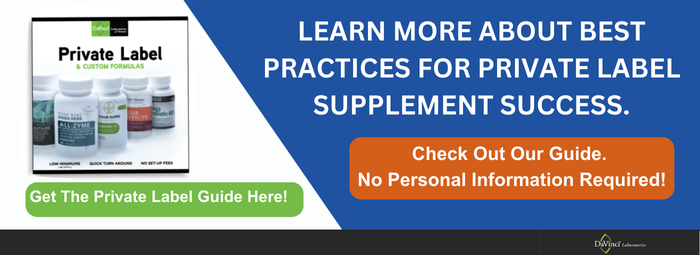
Are you in the fitness industry without selling supplements? If so, you could be missing out on a lucrative opportunity.
Whether you’re already meeting your goals or are wondering how to make money in the fitness industry, private label supplements can push your revenue to the next level.
What are Private Label Supplements?
Private label supplements are dietary supplements tested and manufactured by one company, but marketed and sold under the branding of another. While the manufacturer takes care of the groundwork for developing high-quality supplements, the savvy fitness entrepreneur cherry-picks the best formulations for their customer base and directly offers them the products.
Perfectly suited for fitness and other wellness businesses, private label supplements can help get the products people need into their hands. Saving ample time and money in research and development, manufacturing, and even marketing, entrepreneurs can launch their products quickly and rest assured that their high-quality manufacturing partner has utilized only pure, potent ingredients.

Who Can Sell Private Label Supplements?
Instead of recreating the wheel, a wellness practitioner or e-commerce entrepreneur can select sought-after dietary supplements and sell them under their own brand to their existing audiences and customers.
Private label supplements aren’t limited to single vitamins or basic herbal blends. They can include a wide range of products, from vitamins, minerals, and herbal supplements, to weight management enzyme blends and sports nutrition products.*
Business owners can get creative, developing new formulations or tweaking existing supplements to best meet the needs of their unique customer base. They’re available in various delivery formats, from traditional capsules and tablets to nanoparticulate powders and liposomal liquids.
Safety and effectiveness of your private label supplement will be heavily dependent on the manufacturer, their sourcing, and their quality control protocols. That’s why it’s crucial to select a reputable, trusted manufacturing partner as you develop and launch your products.
Private label supplements used to be reserved for healthcare practitioners. The rise of social media, influencers, and e-commerce has opened the door to other businesses well suited to offer targeted supplements, like health coaches, fitness apps, gyms, yoga instructors, and more.
Why are Fitness Apps and Businesses Perfectly Situated to Sell Private Label Supplements?
If you’re already running a business or becoming an influencer in the fitness industry, you are in a great position to offer private label supplements. You’ve researched your niche, have loyal followers, and know how to address their needs and wants.
Here are the top five reasons your business should offer private label supplements:
- Targeted Audience: Fitness apps and related businesses cater to people who are interested in improving their health and achieving their fitness goals. This audience is already tuned in, learning, and being inspired by your message and offerings. It’s the perfect time to offer them targeted supplements under your familiar branding.
- Credibility: As a business owner in the fitness industry, you’re recognized as a credible authority on healthy, active lifestyles. Whether you’re currently offering workout routines, food plans, or motivational coaching, you can offer supplements specific to the goals of your customer base.
- Personalization: Each fitness business or app targets a particular audience or specific need. The beauty of offering private label supplements is that you can go beyond the obvious, market-saturated products and offer more complex formulations or personalized products. If your audience is mostly interested in weight management, you can offer a supplement line specifically designed to help them achieve that goal, featuring products like Adipo-Leptin Benefits, Scale Down, Mango-Plex, or ThermoSet.*
- Branding: Lean into your unique selling position by promoting high-quality supplements under your own brand, utilizing your familiar logo and marketing materials. Fitness companies can expand their loyal audiences by selling private label supplements specifically connected to their business, rather than linking to competitors or outside websites.
- Increased Revenue: Selling private label supplements can provide an additional revenue stream for fitness apps and businesses. You’re in charge of your product offerings, selecting the quantities, price points, and profit margins, maximizing revenue and minimizing inventory waste.
How Can Private Label Supplements Boost Revenue?
Private label supplements are profitable because they have low start-up costs and order minimums. Not only do they dramatically increase customer loyalty, private label supplements also enhance your credibility and create significant active and passive revenue streams. Successful entrepreneurs in the health and wellness industry report adding over six figures per year with private label supplements.
When it comes to private supplements, you have options. You can start small with just a few key products and slowly build your offerings, or dive right in and create custom formulations for a robust product line. You can choose to sell your branded supplements via websites, e-commerce platforms, or even in physical retail spaces.
As a fitness professional, you want to support your clients as best you can. This includes offering the high-quality dietary supplements they need and want. Private label supplements are a win-win situation, boosting customer’s results and your bottom line.
8 Steps to Start Selling Private Label Supplements in Your Fitness Business
- Identify Your Target Market: Do your research to determine who your ideal customer is, what their needs are, and what types of supplements would be most beneficial for them. Depending on your business, you could focus on serving your existing customers or branching out to reach new ones.
- Choose Your Supplier: Partner with a reputable supplier that provides high-quality supplements in your budget. Consider the supplier's overall track record, manufacturing certifications, included services, and details like minimum order quantities.
- Design Your Label: Your unique brand identity reflects your fitness business and appeals to your target market. Private label supplements give you the opportunity to utilize that brand recognition by creating an eye-catching and compliant label for your product. Don’t worry—a good supplier will help you navigate these regulations.
- Choose Your Products: Peruse the existing offerings and decide which products you want to start selling based on your target market's unique needs and preferences. Consider the factors most important to them, such as potency, purity, delivery format, and cost. If your clients want help burning fat and building muscle in the gym, offer nutritional supplements like Cocoa HGH and Gluconic DMG.* If your fitness app offers exercises to those who need extra joint support, present them with a Perna Pro offer.*
- Order Your Products: Place your first order with your supplier, double checking the details from logos to labels, and getting just the right quantity to fulfill your orders without breaking the bank.
- Promote Your Products: Develop a marketing plan to promote your private label supplements to your existing clients and to potential new customers. Consider utilizing social media, email marketing, and in-person promotions to reach a variety of people.
- Track Your Results: Track your sales and take note of customer feedback to determine which products are most popular and which ones might need to be substituted, reformulated, or marketed in a different way.
- Expand Your Product Line: As your business grows, consider expanding your product line to include additional supplements that appeal to your target market. Utilize cross-sell or up-sell email marketing campaigns to reach those customers who are most likely to branch out and explore your next products.
Takeaway
You don’t need to be a doctor to sell vitamins and minerals. Fitness industry professionals are uniquely suited to offer private label supplements that meet their clients’ targeted needs.
Nutritionists, sports massage therapists, fitness program directors, and health club managers know the ins and outs of their client’s health and fitness goals. Exercise gurus, social media influencers, and entrepreneurs offering fitness apps have their finger on the pulse of their customers’ unique needs.
Any business owner in the fitness industry can take advantage of this lucrative income stream. With the right manufacturing supplier as your partner, offering private label supplements will be a win-win situation for both you and your customers.


















